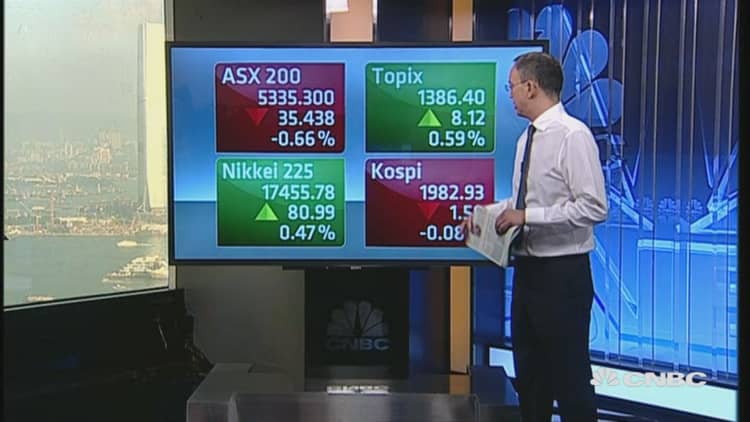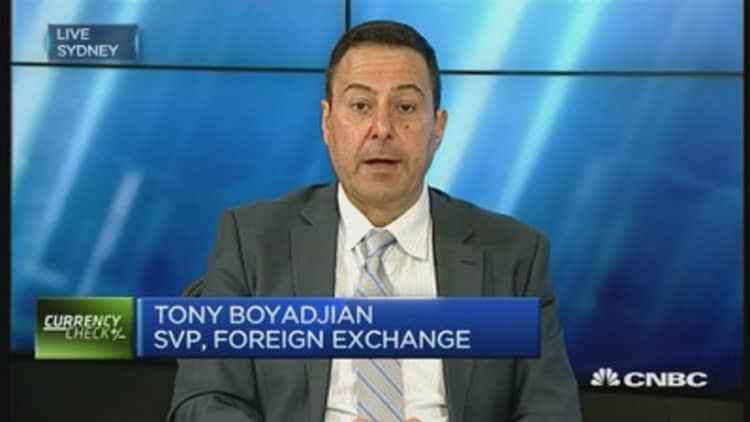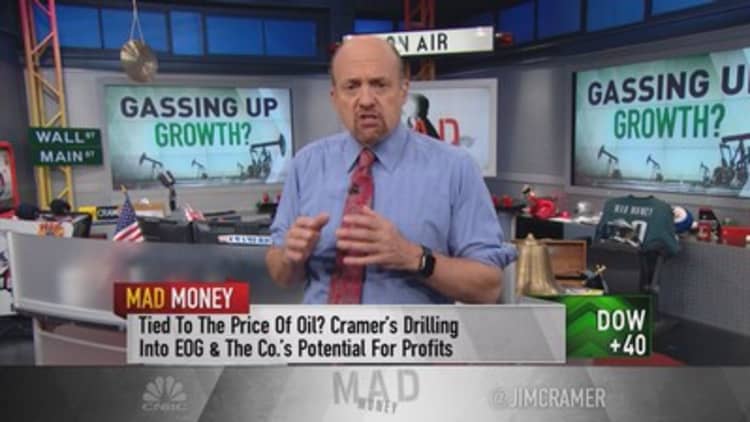
Asia markets traded mixed, with the Nikkei continuing its third straight session of gains, likely getting a boost from a weaker yen and better-than-expected Japanese economic data.
The jumped 1.71 percent, or 297.83 points, to end at 17,672.62, following the release of Japan's third-quarter gross domestic product (GDP), which showed the economy grew 2.2 percent year-on-year, beating a Reuters poll estimate of 0.9 percent.
The yen remained weak against the dollar early in Asia, with the dollar fetching 107.52 yen as of 3:06 pm HK/SIN, compared with levels around 104 on election day in the U.S. last week.
Down Under, the benchmark ASX 200 closed down 0.47 percent, or 25.04 points, at 5,345.7, weighed by its materials subindex, which was down 1.31 percent, and its financials subindex, which fell 0.53 percent.
Australia's major banks Westpac and ANZ fell 3.17 percent and 1.45 percent respectively, as they traded ex-dividend.
Major gold miners were also lower; Newcrest Mining was down 7.08 percent, Northern Star Resources slipped 9.16 percent and Evolution Mining shed 9.65 percent. The ASX All Ordinaries Gold index was 7.94 percent lower as gold's appeal as a safe haven continued to lose traction after Trump's win.
The ended up 0.44 percent, or 14.06 points, at 3,210.1 and the Shenzhen composite closed up 0.297 percent, or 6.27 points, at 2,114.3. Hong Kong's fell 1.34 percent by 3:11 pm local time.
Economic data out of China on Monday were mixed. China's fixed-asset investment rose 8.3 percent in the January-to-October period, beating market expectations, while October industrial output and retail sales growth missed forecasts. October industrial output rose just 6.1 percent, compared with a Reuters poll forecasting 6.2 percent, while retail sales grew 10 percent on-year in October, missing a Reuters poll estimate of 10.7 percent.
Shares of China's LeEco broke their recent losing streak, trading up as much as 4 percent, before settling up 1.77 percent. Shares of the technology company had been under pressure after its founder wrote a letter to employees admitting to cash and funding problems.
South Korea's Kospi finished down 0.51 percent, or 10.03 points, at 1,974.4, amid a growing political crisis, which saw hundred of thousands of demonstrators calling for President Park Geun-hye's resignation over the weekend.
But U.S. political developments engrossed the market's attention, analysts said.
"The market will remain alert to any news on President-elect Trump's policies and possible appointments. In this regard we may be due for something of a reality check," said Ray Attrill, co-head of FX strategy at National Australia Bank, in a note on Monday.
Attrill pointed to a Wall Street Journal report on Saturday that showed Trump's infrastructure plans boiled down to a tax break in the hopes of luring capital to projects, which industry experts say could fall short of adequately funding improvements to roads, bridges and airports.

The greenback continued to trade higher against a basket of currencies at 99.549, its seventh straight session of gains. That compared with levels below 97 in the days before the election last week.
The U.S. benchmark 10-year Treasury note saw its yield at its highest since January, rising to 2.2189 percent, compared with levels below 1.8 percent in the days before the election. The yield on 30-year Treasury bonds rose to 3.0182 percent, compared with levels below 2.6 percent in the days leading up to the election.
The dollar's strength meant "the Federal Reserve now faces the conundrum of rising inflation expectations, some concerns in high yield credit and growing signs of stress in emerging market assets," Chris Weston, chief market strategist at IG, said in a note on Monday.
The fell as low as $0.7071 in Asia trade, and was trading at $0.7083 as of 1:22 pm HK/SIN, compared with levels above $0.72 last week, after another earthquake struck the country on Monday, this time of magnitude 6.2. That followed an earthquake of 7.8 magnitude that struck New Zealand's South Island just after midnight.
Some analysts expected the currency weakness would be short-lived.
"Sharp falls in the currency in the days following the February 2011 earthquake (5-6 percent) were reversed in subsequent weeks and months as anticipation of insurance payouts from overseas and the positive economic impact of the rebuilding of Christchurch were factored in," said NAB's Attrill.
The earthquake also weighed on shares of New Zealand insurer Tower, which was off 7.06 percent, after falling as much as 10.6 percent to a 13-year low earlier in the session. The broader NZX 50 index ended up 0.597 percent, or 39.98 points, at 6,737.76.

In energy news, U.S. crude futures were down 0.23 percent at $43.31 a barrel, while Brent was down 0.02 percent, at $44.74.
On Friday, oil prices had settled down more than 2 percent in the U.S. session after the Organization of Petroleum Exporting Countries (OPEC) reported that output climbed to 33.64 million barrels a day in October, up 240,000 barrels a day from the month before.
were down 0.1 percent, at $1,224.99 an ounce, extending four straight sessions of declines as market players stepped away from the safe-haven play after the U.S. election.
U.S. markets closed mostly higher on Friday. The closed up 0.21 percent at 18,847.66, capping its best weekly performance since December 2011, with a gain of 5.54 percent for the week. The S&P 500 slipped 0.14 percent to 2,164.45, while the composite closed up 0.54 percent at 5,237.11.
— Follow CNBC International on Twitter and Facebook.

